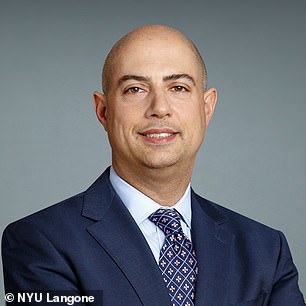Some patients are still conscious an HOUR after their heart stops, according to a major study into near-death experiences
People who are brought back to life after a near-death experience can still have memories and understand what’s happening around them for up to an hour after their hearts stop, a study suggests.
The first study of its kind following cardiac arrest survivors found that nearly 40 percent of people undergoing CPR had memories, dream-like experiences or some perception of what was happening around them.
Researchers have long been trying to understand what happens after death. This study provides insight into the little-understood world of near-death experiences.
These processes can open access to “new dimensions of reality,” the researchers wrote, and “open the door to a systematic exploration of what happens when someone dies.”
Additionally, the findings could inspire new treatments to restart the heart and prevent brain injury.
Dr. Sam Parnia, senior study author and critical care physician at NYU Langone in New York City, said: ‘Although doctors have long thought that the brain suffers permanent damage about 10 minutes after the heart stops supplying oxygen, our research has found that the brain may show signs of electrical recovery long during ongoing resuscitation.’
“This is the first major study to show that these memories and brain wave changes may be signs of universal, shared elements of so-called near-death experiences.”
The first study of its kind in the journal Resuscitation found that nearly 40 percent of people undergoing CPR had memories, dream-like experiences, or an idea of what was happening around them.
The study, published Thursday in the journal Resuscitationexamined 567 patients at 25 hospitals in the US and Britain who were revived after cardiac arrest between May 2017 and March 2020. However, only less than 10 percent survived.
Of those 53 survivors, the researchers interviewed 28.
Researchers looked at brain wave activity and tested whether participants could remember certain sights and sounds. During resuscitation, they placed headphones on patients and played three words – apple, pear and banana – while using a tablet to display ten images.
Only one of the 28 participants remembered the order of the words correctly, and none could remember the images.
Eleven survivors reported having memories or perceptions that suggested they were at least somewhat conscious when revived. They had at least some mental function based on measured brain oxygen and activity levels.
Some patients recalled dreamlike experiences, such as being chased by police or caught in the rain.

One patient recalled, “I (went to a house I shouldn’t have been in). (The police) caught me… (I thought about how to explain what I was doing in the house). Then I walked into a puddle… When I came out of the puddle, I wasn’t wet, and I kind of disappeared into the sidewalk… There was a fisherman who sang a sailor’s song about me, and it rained. ”
Others remembered their medical treatment, such as pain, pressure or hearing doctors.
“I remember coming back and they put those two electrodes on my chest, and I remember the shock,” one participant said.
Another said: ‘I felt someone doing something on my chest. I couldn’t feel the actual compressions, but I could feel someone rubbing quite hard. It was quite painful.”
Several participants saw certain loved ones. “I remember seeing my father,” one said.
Another recalled: ‘I thought I heard my grandmother (who has passed away) say, ‘You have to go back.’
And others saw even more stereotypical images, such as bright, white lights.
‘I remember a being of light… standing next to me. It loomed over me like a great tower of power, but radiated only warmth and love… I caught a glimpse of my life and felt pride, love, joy and sadness, all flooding within me,” said one patient .
‘Every image was mine, but from the point of view of a being standing or watching… I was shown the consequences of my life, thousands of people I had interacted with and felt what they felt about me, saw their lives and how I influenced them.’
“Then I saw the consequences of my life and the impact of my actions.”
The researchers wrote that the findings “may also provide guidance for designing new ways to restart the heart or prevent brain injury and have implications for transplantation.”
The team plans to conduct further research into near-death experiences and the long-term effects of coming back to life after cardiac arrest.
